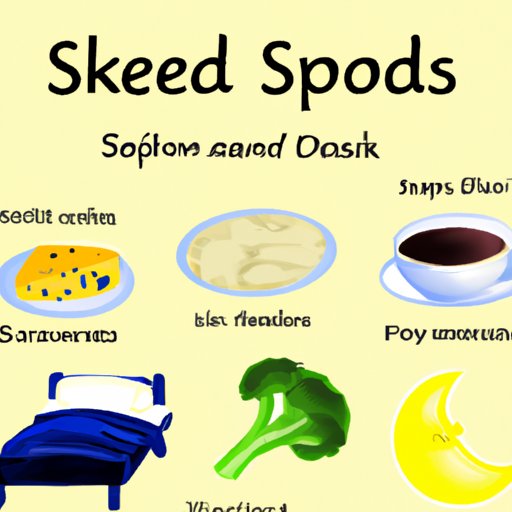
I. Introduction
Have you ever felt drowsy after a big meal, or found yourself struggling to keep your eyes open after a certain food? Certain foods can have a significant impact on your body, including your sleep habits. It’s important to know which foods can promote healthy sleep, and which ones to avoid for a good night’s rest.
II. Top 10 Foods that Can Make You Feel Drowsy
Drowsiness is not solely caused by fatigue, but also by chemical processes in the body. Some foods contain chemicals that can make you feel more tired, such as L-tryptophan, an amino acid that helps produce serotonin and melatonin. Here are the top 10 foods that can make you feel drowsy:
- Turkey
- Bananas
- Milk
- Cheese
- Potatoes
- Oats
- Cherries
- Lettuce
- Almonds
- Honey
These foods all contain sleep-promoting substances such as tryptophan, magnesium, and calcium. The body converts tryptophan into serotonin, a neurotransmitter that promotes relaxation, and then into melatonin, a hormone that helps regulate the sleep-wake cycle.
III. Foods to Avoid for a Good Night’s Sleep
Just as some foods can promote sleep, other foods can interfere with it. Here are some foods to avoid before bedtime:
- Caffeine
- Sugar
- Spicy Foods
- High-Fat Foods
- Alcohol
Caffeine and sugar can keep you awake and interfere with your ability to fall asleep. Spicy and high-fat foods can cause heartburn or indigestion, making it difficult to sleep. Alcohol may cause drowsiness initially, but disrupts sleep later in the night.
Instead, try consuming foods that are less likely to interfere with sleep, such as:
- Decaf drinks
- Complex carbs
- Nuts and seeds
- Lean protein
- Leafy greens
These foods can help maintain steady blood sugar levels and promote feelings of fullness, reducing the chances of sleep-disrupting hunger pangs.
IV. Relationship Between Food and Sleep Patterns
Studies have found that certain nutrients can affect the body’s circadian rhythm, which is responsible for regulating sleep-wake cycles. Here are some examples of how food can affect sleep:
- Tryptophan-rich foods can help increase the body’s production of melatonin, promoting sleep.
- Carbohydrates, especially complex carbs, can help promote feelings of calmness and relaxation by increasing the production of serotonin.
- Magnesium, found in leafy greens and nuts, can help promote relaxation by regulating the neurotransmitter GABA, which helps calm the nervous system.
By incorporating sleep-promoting nutrients into your diet, you can improve the quality of your sleep and avoid tossing and turning at night.
V. Recipes for Sleep-Inducing Snacks and Beverages
Here are some easy-to-make snacks and drinks that can help promote healthy sleep:
Warm Milk with Honey
Warm milk has long been known as a natural sleep aid, and adding a bit of honey can help regulate blood sugar levels.
- 1 cup of milk (dairy or non-dairy)
- 1 tsp of honey
- Cinnamon (optional)
Heat the milk in a saucepan until it’s warm but not boiling. Pour it into a mug and stir in the honey. Sprinkle with cinnamon if desired.
Herbal Tea
Herbal teas such as chamomile and valerian root have been shown to promote relaxation and can help improve sleep quality.
- 1 tea bag of chamomile or valerian root
- 8 oz of hot water
- Honey or lemon (optional)
Steep the tea bag in a mug of hot water for 3-5 minutes. Remove the tea bag and add honey or lemon if desired.
Sleep-Promoting Snack Bars
These homemade snack bars are a tasty and convenient way to incorporate sleep-promoting foods into your diet.
- 1 cup of rolled oats
- 1/2 cup of almond butter
- 1/3 cup of honey
- 1/4 cup of chopped almonds
- 1/4 cup of dried cherries
- 1/4 tsp of cinnamon
Preheat the oven to 350°F. Mix all ingredients in a bowl until well combined. Press the mixture into an 8-inch baking dish and bake for 15-20 minutes or until golden brown. Let it cool before cutting into bars.
VI. Tips for Incorporating Sleep-Inducing Foods into Meal Plans
Here are some tips on how to incorporate sleep-promoting foods into your everyday meals:
- Start your day with a protein-packed breakfast that contains healthy fats and complex carbs.
- Include plenty of leafy greens and colorful vegetables in your meals throughout the day.
- Snack on nuts, seeds, and fruits to keep your energy levels steady.
- Choose lean protein such as chicken, fish, or tofu for dinner, and include tryptophan-rich foods such as turkey or oats.
- Avoid heavy or spicy meals close to bedtime.
By making small adjustments to your daily diet, you can promote healthy sleep and improve your overall well-being.
VII. Conclusion
A good night’s sleep is essential for overall health and well-being, and incorporating sleep-promoting foods into your diet can be an effective and natural way to improve the quality of your sleep. By consuming the top 10 sleep-inducing foods, avoiding sleep-disrupting foods, and implementing healthy meal plans and sleep-inducing snacks and beverages, you’ll be on your way to a more restful and rejuvenating night’s sleep.





